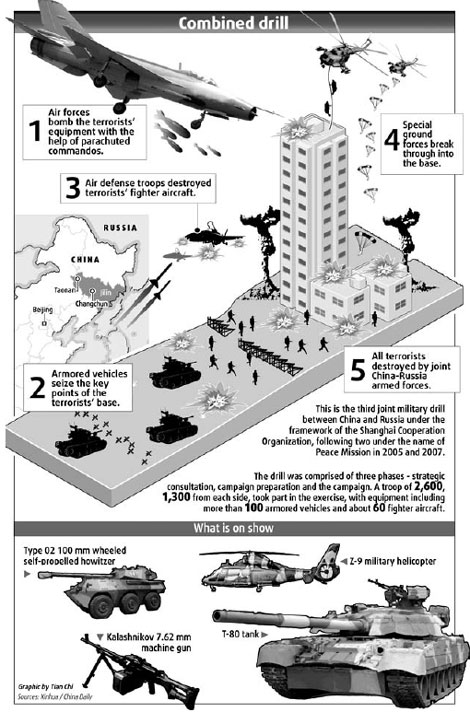
|
CHINA> National
 |
|
Explosive ending to anti-terrorism exercise
By Li Xiaokun and Peng Kuang (China Daily)
Updated: 2009-07-27 07:58 TAONAN, Jilin: As fighter planes roared overhead, China and Russia Sunday sent thousands of troops to liberate a country taken over by terrorists. Covered by intensive fire, special force snipers bailed out of helicopters as dozens of fighter jets, including Su 24 and Su 27 bombers, took control of the sky.
Tanks and infantry vehicles, along with 2,600 soldiers, filled the grasslands with sounds of gunfire, missiles and bombs. The "terrorist" group of 31,000 was soon wiped out and the "country", set up temporarily at a military training base in Jinlin province, was liberated.
"It was fantastic!" said a Chinese officer at the site who declined to be named. "Did you see the 18 Chinese cannons? The bombs were shot at the same time and fell at almost the same place. And when the Russian paratroopers bailed out and formed a fabulous pattern, Chinese soldiers burst into applause." Russian troops alone used more than 100 tons of ammunition Sunday, said the Russian Information Agency. China Central Television made a rare move by broadcasting the whole event live. Despite some reporters' concerns for pilots over the shadows cast by the Chinese plane crash here on July 19 that killed both pilots, all planes flew safely Sunday. Deputy Chief of the General Staff of Chinese Armed Forces Ma Xiaotian, and Nikolai Makarov, chief of the General Staff of the Russian Armed Forces, said they were satisfied with the drill. "The two troops presented high-level fighting skills and cooperation," Ma said.
 "The drill announced China and Russia's resolution to jointly fight regional and international terrorism and reflects our capability to do so." The drill came weeks after separatist forces in Xinjiang instigated riots on July 5, leaving 197 people killed and more than 800 injured. The separatists are believed to be financed through Western countries and members often flee to Middle Asian countries. Chief of General Staff of Chinese Armed Forces Chen Bingde said last week when watching an exercise here that he could not exclude the possibility of Beijing sending troops abroad to combat terrorists. This is the third such drill between China and Russia under the name of Peace Mission, after two in 2005 and 2007.
Tan Soon Lee, defence attach of the Singaporean embassy in China, told China Daily: "We also held our first joint exercise with China in Guangxi Zhuang autonomous region last month. But it's too small to be compared with this one, which had an extremely large number of terrorists." He added the drill combined characteristics of traditional and anti-terror combat. Representatives from other member countries of the Shanghai Cooperation Organization, anti-terror organizations and military attaches of other countries also witnessed the drill. We're only friends Though Beijing and Moscow have clarified they are not forging a military league but just a strategic partnership, the eye-catching drill attracted attention. A UPI report said last week the exercise marks a growing relationship between the two giant neighbors, a tone agreed by many Russian media. A famous Russian political critic told Russian media the drill can also been seen as an adjustment in Moscow's relations with Beijing. "We should protect our friendship with China and avoid conflict. There's no need for us to hide anything from each other," the critic said. That is the same guiding principle held by Russian troops here. They told the Chinese military the drill was similar to their experiences during two conflicts in Chechnya. "Even Deputy Commander of the Russian Armed Forces Alexander Studenkin taught us a lot. He spent three years fighting in Chechnya," said Zhang Xudong, senior colonel of Shenyang Military Area. "They do not hide what they know from us." "We have become friends with China in previous drills. We have formed a real relationship," said Makarov. The two militaries have conducted 12 rounds of consultation at the level of deputy chief of general staff since 1997. Last year, Beijing set up a military hotline with Moscow, its first with another country. The next such drill will be conducted in 2010 in Kazakhstan. |